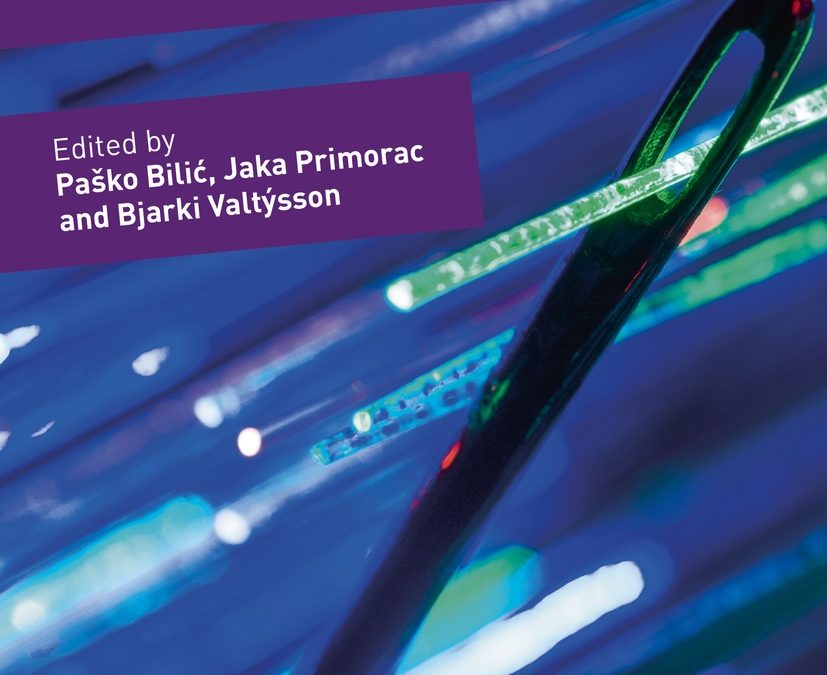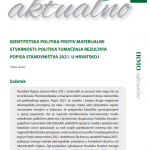
Publisher: Palgrave Macmillan
Year: 2018
ISBN 978-3-319-76279-1
Paško Bilić, PhD and Jaka Primorac,PhD researchers from the Department for Culture and Communication, IRMO in cooperation with Bjarki Valtýsson, PhD (University of Copenhagen) are the editors of the edited volume entitled ‘Technologies of Labour and the Politics of Contradiction’ published by Palgrave Macmillan in the ‘Dynamics of Virtual Work’ series.
The book is situated in the nexus between technology, labour and politics. It focuses on contradictions as heuristic devices that uncover struggles, frictions and ambiguities of digitalization in work and labour environments. Topics include contradictions in automation, internet platforms, digital practices, creative industries, communication industries, human interaction, democratic participation and regulation. Three cross-cutting themes can be identified within the diverse chapters represented in the book. First, many authors argue that labour and economic valorisation occur outside of the traditional concept of working space and time. Second, digital technology is not fixed under capital. It is malleable and mouldable. Third, many political tensions are occurring without organized awareness or dissent.
The book will, therefore, be of interest to researchers and students in the fields of sociology of work, media studies, cultural studies, gender studies, science and technology studies and Critical Theory as well as to trade-unionists and policy makers.
Table of contents:
- Paško Bilić (IRMO), Jaka Primorac (IRMO), Bjarki Valtysson (University of Copenhagen, Denmark). “Technology, Labour and Politics in the 21st Century – Old Struggles in New Clothing”
- Sabine Pfeiffer (University of Hohenheim, Germany). “Industry 4.0: Robotics and Contradictions“
- Eran Fisher (Open University Israel). “From Ford to Facebook: Time and Technologies of Work”
- Paško Bilić (IRMO). “The Production of Algorithms and the Cultural Politics of Web Search”
- Ivo Furman (Istanbul Bilgi University, Turkey). “Algorithms, Dashboards and Datafication: A Critical Evaluation of Social Media Monitoring”
- Ingrid Forsler and Julia Velkova (Södretorn University, Sweden). “Efficient Worker or Reflective Practitioner? Competing Technical Rationalities of Media Software Tools”
- Valerija Barada (University of Zadar) and Jaka Primorac (IRMO). “In the Golden Cage of Creative Industries: Public-Private Valuing of Female Creative Labour”
- Lidia Arroyo (Autonomous University of Barcelona, Spain). “Digital Inclusion for Better Job Opportunities? The Case of Women E-Included through Lifelong Learning Programmes”
- Brian Beaton (California State Polytechnic, USA). “A Recent Story about Uber”
- Reinhard Anton Handler (Karlstadt University, Sweden). “Protocols of Control: Collaboration in Free and Open Source Software”
- Raul Ferrer Conill (Karlstadt University, Sweden). “Playbour and the Gamification of Work: Empowerment, Exploitation and Fun as Labour Dynamics”
- Aleksander Sašo Slaček Brlek (University of Ljubljana, Slovenia). “Audience Metrics as a Decision-making Factor in Slovene Online News Organizations”
- Göran Bolin (Södertorn University, Sweden). “Media Use and the Extended Commodification of the Lifeworld”
- Bjarki Valtýsson (University of Copenhagen, Denmark). “Regulation, Technology, and Civic Agency: The Case of Facebook”
- Pamela Meil (Institute for Social Research München, Germany). “Spinning the Web: The Contradictions of Researching and Regulating Digital Work and Labour”
Reviews
“What distinguishes this collection is its thematisation of the contradictions attending computerized and networked labour. This seems to suggest an orientation towards contestations, complications, paradoxes and ambivalences that might have been flattened out or neglected in partisan polemics. As such, it could mark a ‘maturing’ of the digital labour debates, and as such is to be welcomed.” (Nick Dyer-Witheford, University of Western Ontario, Canada)
“In a world dominated by social media, widespread algorithmic direction of human activities, and, imminently, sweeping robotisation, this empirically wide-ranging analysis of the labour-technology relationship could not be more timely or pressing.” (Juliet Webster, Work & Equality Research, UK)
“Technologies of Labour and the Politics of Contradiction provides an excellent contribution to current debates in the trend toward labour capture in digitalized environments. Bilić, Primorac and Valtysson have gathered several extremely important case studies and theoretical interventions, bringing to light a range of worrying contradictions and volatility of labour markets where the future is yet undetermined, where artificial intelligence hints toward barbarism and extreme working conditions are hidden behind black box mythologies.” (Phoebe V Moore, Leicester University Business School, UK)
LINKS
The book is available by following this link: Technologies of Labour and the Politics of Contradiction


